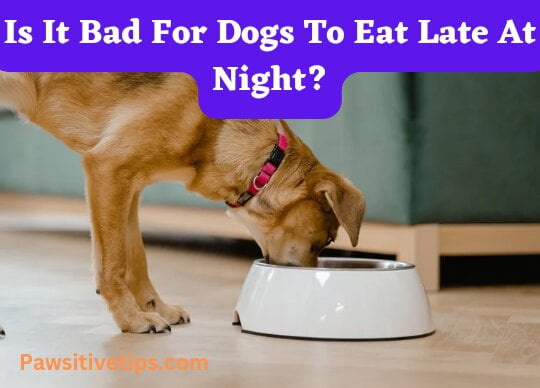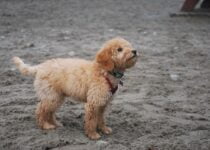Is It Bad For Dogs To Eat Late At Night?
Is it bad for dogs to eat late at night? I have come across many dog owners asking this question in many pet forums, and it seems to often spark debate among pet owners with varying opinions and conflicting advice. In this article, I will try as much as I can to answer the question and other related concerns so you can learn the importance of optimal feeding times for your dogs. So, let’s dive in and uncover the truth behind late-night dog feedings.
Before I start, you may also like to check out the expert answer or response to this question: “Should I give my dog a treat before bed?”
Is it bad for dogs to eat late at night?
Yes, feeding dogs late at night has negative implications for their health and well-being. Although each dog is unique and may have different digestion patterns, but it is generally not advisable to feed your dog late at night before bed to avoid unhealthy weight gain, which is pretty bad for their health. Even if, for any reason, you choose to feed your dog late at night, please avoid feeding them large meals or heavy portions right before bedtime.
Why feeding your dog late at night is bad
Here are some of the reasons why feeding your dog late at night may be a very bad move as a dog owner:
1) Your dog may gain unhealthy weight
Feeding your dog late at night can contribute to unhealthy weight gain and obesity. When a dog consumes a large meal before bedtime, they are less likely to burn off those calories before sleep, potentially leading to weight gain over time. Obesity in dogs can lead to a range of health issues, including joint problems, heart disease, and diabetes.
2) May increase urinary accidents
Feeding your dog very late at night may increase the likelihood of urinary accidents during the night. Dogs often need to relieve themselves after eating, and providing a meal right before bedtime may disrupt their usual bathroom routine. This can lead to accidents inside the house and unnecessary stress for both you and your pet. Before you move on to the next point, check out the best time to feed dogs so they don’t poop at night.
3) It may increase the risk of heart disease
Another reason why you shouldn’t feed your dog late at night is that it can contribute to an increased risk of heart disease. When a dog consumes a heavy meal close to bedtime, their body may still be working to digest the food while they sleep. This puts additional strain on the cardiovascular system, as blood flow and oxygenation may be redirected to aid digestion rather than being efficiently circulated throughout the body. Over time, this strain can contribute to the development of heart disease or exacerbate existing cardiac conditions.
4) Excess energy to burn at night
Dogs are naturally active animals, and they require regular exercise and mental stimulation to maintain a healthy balance. When dogs eat late at night, they may experience a surge in energy when they should be winding down for sleep. This excess energy can lead to restlessness, pacing, and difficulty settling down for the night. If your dog is not given an opportunity to burn off this energy before bedtime, it may result in disruptive behaviors or a restless night for both your pet and yourself.
5) It causes lethargy during the day
Feeding your dog late at night can disrupt their natural circadian rhythm, leading to lethargy and decreased activity during the day. Dogs have a diurnal sleep pattern, meaning they are typically more active during daylight hours. When their sleep is disrupted due to late-night feedings, they may be groggy or lethargic the following day, affecting their overall energy levels and engagement in activities. This can impact their quality of life and hinder their ability to participate in exercise, playtime, or training sessions.
Why does my dog wake me up in the night for food?
If your dog consistently wakes you up in the middle of the night for food, there are several potential reasons for this behavior. Understanding why your dog exhibits this behavior can help you address the underlying cause and find a solution. Here are some compelling reasons why your dog may wake you up late in the night for food:
1. Your dog may be hungry
The most straightforward explanation is that your dog is genuinely hungry. There could be various reasons for increased hunger, such as a change in their activity level, metabolic rate, or the quality of their current diet. If your dog’s hunger is genuine, consider adjusting their feeding schedule or consulting with your veterinarian to ensure they are receiving an appropriate amount of food.
2. He may be having anxiety or seeking attention
Some dogs may wake their owners up for food as a result of anxiety or a desire for attention. If your dog feels anxious when left alone or craves attention, they may wake you up as a way to alleviate their anxiety or to engage with you. It’s essential to address any underlying anxiety or separation issues through positive reinforcement training, crate training, or seeking guidance from a professional dog behaviorist.
3. Your dog may be suffering from a medical problem
Certain medical conditions can cause an increase in appetite or disrupt your dog’s regular eating patterns. Conditions such as diabetes, thyroid imbalances, or gastrointestinal disorders can lead to increased hunger or discomfort that prompts your dog to wake you up for food. If you suspect a medical issue, consult with your veterinarian to rule out any underlying health concerns.
4. Lack of satiety
Your dog’s current diet may not be satisfying their nutritional needs or keeping them feeling full. Low-quality or poorly balanced diets can leave dogs feeling hungry even after a meal. Consider evaluating the nutritional content of your dog’s food and switching to a high-quality, balanced diet that meets their specific dietary requirements.
5. Boredom or lack of mental stimulation
Dogs need mental stimulation to stay content and avoid boredom. If your dog is waking you up for food, they may be seeking attention, interaction, or mental stimulation. Ensure that your dog is getting sufficient exercise, playtime, and mental enrichment throughout the day to prevent them from resorting to waking you up for food.
What if I forgot to feed my dog a meal?
Forgetting to feed your dog a meal occasionally is generally not a cause for immediate concern. Dogs are resilient and can tolerate missing a meal without experiencing severe consequences, especially if it happens infrequently. Here are some potential effects of occasionally missing a meal:
- Hunger and Discomfort: Just like humans, dogs rely on regular meals to meet their energy and nutritional requirements. If you forget to feed your dog a meal, they may experience temporary hunger and discomfort. They may show signs of restlessness, increased begging, or vocalizations to indicate their hunger.
- Lower Energy Levels: Missing a meal can result in lower energy levels for your dog. They may appear less active or lethargic as a result. However, this is usually a temporary effect, and once they receive their next meal, their energy levels should return to normal.
- Behavioral Changes: Some dogs may display behavioral changes when they are hungry or have missed a meal. They may become more irritable, restless, or exhibit attention-seeking behavior. However, these changes are typically temporary and should resolve once they are fed.
- Digestive Upset: If your dog has a sensitive stomach or digestive system, missing a meal could potentially lead to a mild digestive upset. This may manifest as an upset stomach, loose stools, or increased gas. However, for most dogs, missing a single meal should not result in significant digestive issues.
Should I feed my dog several times a day or just once at night?
It is generally recommended to feed adult dogs two meals a day, spaced evenly apart, rather than feeding them just once at night. Providing two meals allows for better digestion, helps maintain energy levels throughout the day, and reduces the risk of hunger-related behavior. However, specific feeding frequencies may vary depending on factors such as your dog’s age, size, health, and activity level. Consulting with your veterinarian can help determine the best feeding schedule for your individual dog.
Conclusion
That’s it, guys! I hope I have been able to provide the best answer to this question: “Is it bad to feed a dog late at night?” If you have any other questions, drop them in the comment section.



